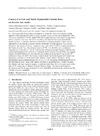Identificador persistente para citar o vincular este elemento:
https://accedacris.ulpgc.es/jspui/handle/10553/50059
| Título: | Canary Current and North Equatorial Current from an inverse box model | Autores/as: | Hernández-Guerra, Alonso Fraile Nuez,Eugenio López-Laatzen, Federico Martínez Marrero, Antonio Parrilla, Gregorio Vélez Belchí,Pedro |
Clasificación UNESCO: | 251007 Oceanografía física | Palabras clave: | Canary current North equatorial current |
Fecha de publicación: | 2005 | Publicación seriada: | Journal of geophysical research. Oceans | Resumen: | The large‐scale Canary Basin circulation is estimated from a box inverse model applied to hydrographic data from a quasi‐synoptic survey carried out in September 2003. The cruise consisted of 76 full depth CTD and oxygen stations. Circulation is required to nearly conserve mass and anomalies of salinity and heat within layers bounded by neutral surfaces. It permits advective and diffusive exchange between layers and an adjustment of the Ekman transport and the freshwater flux divergences. The Canary Current at the thermocline layer transports a net mass of 4.7 ± 0.8 Sv southward north of the Canary Islands from the African coast to 19°W. It is divided into a northward circulation at a rate of 1.1 ± 0.5 Sv between the African coast and Lanzarote Island and a southward transport of 5.8 ± 0.6 Sv. It transports North Atlantic Central Water and organic matters advected offshore by the filaments protruding from the upwelling system off northwest Africa. At 24°N, the Canary Current feeds the North Equatorial Current that transports a mixture of North and South Atlantic Central Waters westward. In the intermediate layer a southwestward flow of 1.2 ± 1.1 Sv transports Mediterranean Water to the Subtropical Gyre, though the highest salt flux is transported by a meddy. Oxygen distribution and mass transport suggest a northeastward deep flow of a water mass colder than 2.2°C consisting of diluted Antarctic Bottom Water. The heat and freshwater divergences and the average dianeutral velocity and diffusion between the sections and the African coast are negligible. | URI: | https://accedacris.ulpgc.es/handle/10553/50059 | ISSN: | 2169-9275 | DOI: | 10.1029/2005JC003032 | Fuente: | Journal of Geophysical Research: Oceans, v. 110 (C12019), p. 1-16 |
| Colección: | Artículos |
Citas SCOPUSTM
57
actualizado el 08-jun-2025
Citas de WEB OF SCIENCETM
Citations
51
actualizado el 18-ene-2026
Visitas
264
actualizado el 16-ene-2026
Descargas
534
actualizado el 16-ene-2026
Google ScholarTM
Verifica
Altmetric
Comparte
Exporta metadatos
Los elementos en ULPGC accedaCRIS están protegidos por derechos de autor con todos los derechos reservados, a menos que se indique lo contrario.
